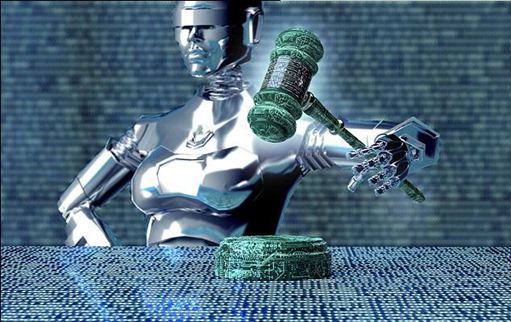导读:邓小平曾经说过,科学技术是第一生产力。在当今社会,科学技术迅猛发展,我们生活的方方面面都受到了它的影响。就连一向以庄严著称的法院也不例外。

An artificial intelligence that predicts the outcome of court proceedings may sound like a futuristic dream.
人工智能预测法院诉讼结果可能听起来像是个遥不可及的梦想。
But a new study claims to have developed an AI that predict the results of human rights trials with 79 per cent accuracy.
但是一项新的研究声称,已经开发出了一种预测人权审判结果的人工智能,其准确度为79%。
The technology is the first to predict the outcomes of major international court trials by analysing case text using a machine learning algorithm, claim the researchers.
研究人员们表示,通过使用机械学习算法分析案例,预测重要国际法院审判结果的技术尚属首例。
The method was devised by researchers at University College London (UCL), the University of Sheffield and the University of Pennsylvania.
该方法由伦敦大学学院(UCL)、谢菲尔德大学和宾夕法尼亚大学的研究人员们设计。
’We don’t see AI replacing judges or lawyers, but we think they’d find it useful for rapidly identifying patterns in cases that lead to certain outcomes,’ explained Dr Nikolaos Aletras, who led the study at UCL Computer Science.
伦敦大学学院计算机科学牵头该项研究的Nikolaos Aletras博士解释道:“人工智能不会取代法官或律师,但是我们认为他们会发现人工智能益处良多,它能够快速识别导致某种特定结果的案件类型。”
’It could also be a valuable tool for highlighting which cases are most likely to be violations of the European Convention on Human Rights.’
“它还十分利于找出哪些案件最有可能违反《欧洲人权公约》。”
The researchers found that judgements by the European Court of Human Rights (ECtHR) are highly linked to non-legal facts, rather than directly legal arguments.
研究人员们发现,欧洲人权法院(ECtHR)的审判与非法律事件息息相关,而不是直接基于法律证据。
This suggests that the judges of the court are, in the jargon of legal theory, ’realists’, rather than ’formalists’.
用法律理论的行话来说就是,法院的法官是“现实主义者”,而非“形式主义者”。
’It should be further pursued and refined, through the systematic examination of more data,’ explained Dr Dimitrios Tsarapatsanis, a Lecturer in Law at the University of Sheffield.
谢菲尔德大学法律讲师Dimitrios Tsarapatsanis博士表示:“通过更多数据的系统检测,我们应该要进一步研究和精确人工智能。”







